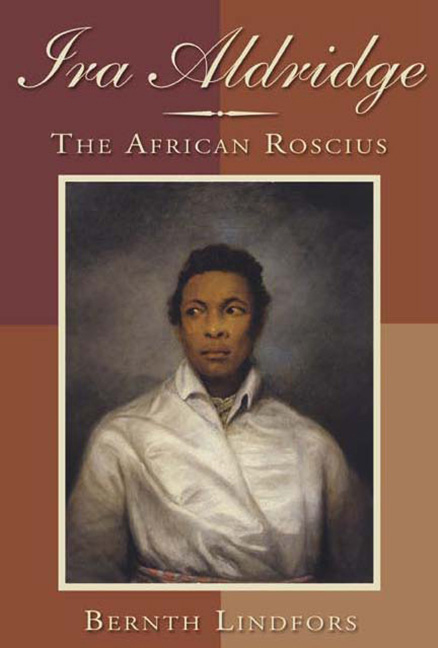Book contents
- Frontmatter
- Miscellaneous Frontmatter
- Contents
- List of Illustrations
- Acknowledgments
- Introduction
- Part One: The Life
- Part Two: The Career
- 8 Ira Aldridge's Fight for Equality
- 9 Ira Aldridge in Manchester
- 10 Acting Black: Othello, Othello Burlesques, and the Performance of Blackness
- 11 Ira Aldridge: Shakespeare and Minstrelsy
- 12 “Mislike me not for my complexion … “: Ira Aldridge in Whiteface
- 13 Ira Aldridge as Macbeth and King Lear
- 14 Creating the Black Hero: Ira Aldridge's The Black Doctor
- 15 The First American on the Zagreb Stage
- 16 A Heartwarming, Radiant Othello in the Netherlands, 1855
- 17 Ira Aldridge's Performances in Meiningen
- 18 “Othello's Occupation's Gone!” The African Roscius in Poland, 1853–67
- Notes on Contributors
- Index
- Miscellaneous Endmatter
13 - Ira Aldridge as Macbeth and King Lear
from Part Two: The Career
Published online by Cambridge University Press: 26 October 2017
- Frontmatter
- Miscellaneous Frontmatter
- Contents
- List of Illustrations
- Acknowledgments
- Introduction
- Part One: The Life
- Part Two: The Career
- 8 Ira Aldridge's Fight for Equality
- 9 Ira Aldridge in Manchester
- 10 Acting Black: Othello, Othello Burlesques, and the Performance of Blackness
- 11 Ira Aldridge: Shakespeare and Minstrelsy
- 12 “Mislike me not for my complexion … “: Ira Aldridge in Whiteface
- 13 Ira Aldridge as Macbeth and King Lear
- 14 Creating the Black Hero: Ira Aldridge's The Black Doctor
- 15 The First American on the Zagreb Stage
- 16 A Heartwarming, Radiant Othello in the Netherlands, 1855
- 17 Ira Aldridge's Performances in Meiningen
- 18 “Othello's Occupation's Gone!” The African Roscius in Poland, 1853–67
- Notes on Contributors
- Index
- Miscellaneous Endmatter
Summary
One must remember that over the long span of his theatrical life Ira Aldridge had seen and studied such eminent British actors as James and Henry Wallack, who played all the roles he later essayed; Junius Brutus Booth and Edmund Kean, followed by William Charles Macready and Samuel Phelps, with their productions of Shakespeare; and Charles Kean with his lesson of painstaking research. He also witnessed the first growth of the realistic theater of Madame Vestris. There was much in his schooling and environment to influence him in the right direction.
If the star actors with whom Aldridge was surrounded in England were of the highest caliber, the same cannot be said of the theater critics. We have studied everything available that the critics had to say about him in Great Britain for over forty years, and found that none came up to the standard of the Continental critics. Nowhere was there such a quality and quantity of critical writing as in Russia. Indeed, it is to the Russian press more than any other that we are indebted for the most detailed description and analysis of his roles, particularly Macbeth and Lear, which pass elsewhere with scarcely a minor reference. First, he was not given the opportunity to act these plays in London, and second, though he did play them in the provinces over the years, they took second place to the melodramas that were in such demand. There was virtually nothing said about them in the provincial press in Britain. But for Germany and Russia we should have had no details of these unique, pioneering performances.
We shall now attempt to reconstruct the actual production, performance, and interpretation of two of Aldridge's major Shakespearean roles, Macbeth (see figure 13.1) and King Lear. Thanks mainly to the pioneering work of his Russian biographer, Sergej Nikolaevich Durylin (whose method of presentation we have adopted), and to the All-Russian Theatrical Society of Moscow, we have been able to get at a very large amount of material, which gives us a picture of the whole flow of Aldridge's performances, every facet of which is documented from contemporary sources without any attempt at fictional reconstruction.
- Type
- Chapter
- Information
- Ira AldridgeThe African Roscius, pp. 191 - 203Publisher: Boydell & BrewerPrint publication year: 2007

